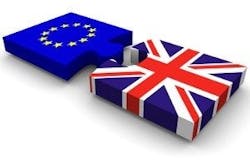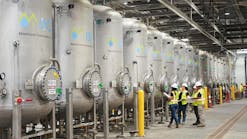LONDON, England – Last week the UK woke up to the surprising news that the majority in England had voted for the country to leave the European Union (EU).
On June 25 it was announced that 51.9% of voters (17.4m) decided to leave the EU, against 48.1% (16.1m) who voted to remain.
As a result of the decision, the British pound fell to a 30-year low amid news of the British exit, known as the Brexit, from the EU.
With the pound now steadying and the FTSE 100 rebounding, what will the decision mean for the UK’s water sector?
EU regulation such as the Water Framework Directive (WFD) and Bathing Water Directive (BWD) have been credited with helping to clean up the country’s waterways and beaches.
Under the vote, Article 50 – a clause that allows the UK to leave the EU – would need to be triggered for the country to separate from the Union.
Dr David Lloyd Owen, managing director of consultancy, Envisager, told WWi: “If Article 50 is put into motion in the next few months, we are looking at Brexit by the end of 2018. That means the UK could be ‘free’ from the WFD before the end of the second management cycle in 2021.
“However, if the UK wishes to do business with Europe, it may well find that as in the cases of Norway and Switzerland, it is a case of ‘pay and no say’ whereby they are bound to comply with EU directives but play no role in the development of this legislation.”
Meanwhile, industry trade association British Water said the decision to leave the European Union is “certain to have a significant impact on a sector where considerable investment is driven by EU directives on water, wastewater and the environment”.
Lloyd Martin, chief executive of British Water, said: “Following the result of the referendum on EU membership, industry finds itself in uncertain yet stimulating times. British Water recognises the significant impact that EU directives and the resulting investment have had in driving improvements in water and wastewater quality and for the environment since water company privatisation in the 1980s.”
Martin added: “As we move into this new era, we will be seeking early clarity of what the post-AMP6 [2020 onwards] landscape may look like for the UK water sector, on behalf of our members. Our membership will welcome stability and we can provide members with expert guidance through our technical and UK forums.”
In a briefing paper posted ahead of the EU referendum vote, the Chartered Institution of Water and Environmental Management (CIWEM), said “the logic of an EU-led initiative on the environment is sound”.
CIWEM added: “Differing environmental approaches member state to member state could significantly undermine the principle of free trade within the European Community. Moreover, increasingly environmental challenges from air pollution to water quality have been understood as transboundary in nature and have required a multi-national approach to resolve. Taking this principle further, negotiations on global environmental challenges have been more effective as a bloc of collective national opinion and commitment.”
The institution highlighted that since the first Environmental Action Programme in 1973, over 500 directives, regulations and decisions are said to have been made regarding environmental management within Europe.
On the topic of energy, as a member of the European Union, the UK has signed up to the Renewable Energy Directive, which mandates the EU as a whole to fulfil 20% of its total energy demand by renewables by 2020.
Following the EU referendum decision, Dr Nina Skorupska, chief executive of the Renewable Energy Association (REA), said: “This result raises serious questions for investor certainty, energy security and much needed investment in the UK energy infrastructure.
“Energy policy must be a priority for the Government now, with industry needing reassurance and ministerial clarity on priorities. The first in this list must be confirmation of the 5th carbon budget, which will hopefully give some confidence in the long-term direction of UK energy policy.
“The vast majority of our members had fears of Brexit, and we will be consulting with them and government in the coming weeks to set out a plan for continued low carbon energy investment, deployment and assurance of the 117,000 jobs in this sector."
###
Read more




